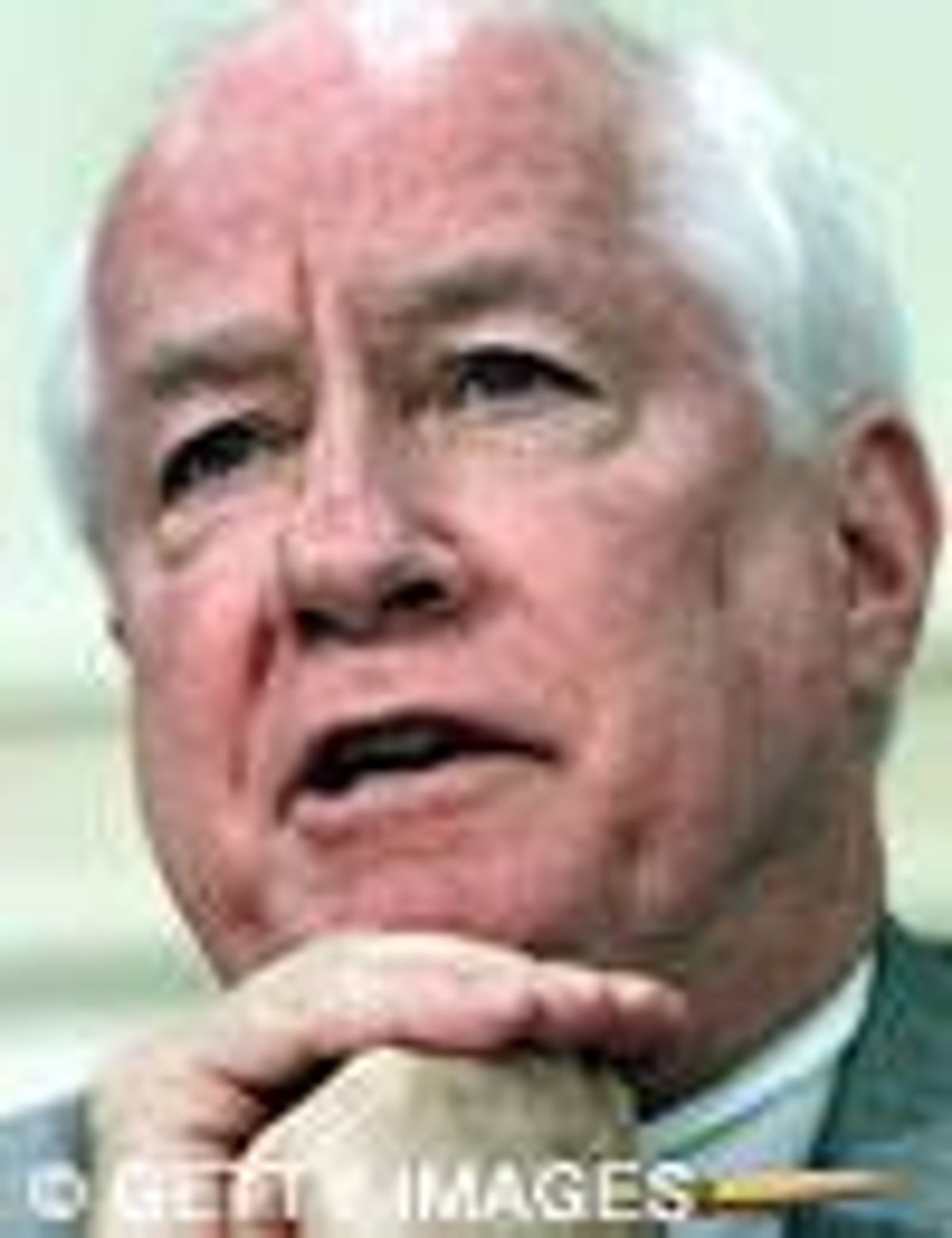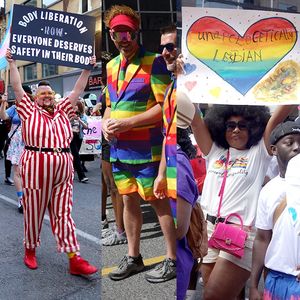On the record
Heated debate
over House approval of the antigay Defense of Marriage Act
shines a wary spotlight on the congressional closet.
They spoke to
their colleagues--and the nation--from
experience. They argued that by passing a bill that
defines marriage strictly as a union between a man and
a woman, the House was trampling on the civil rights of
gays and lesbians. They were talking about their own rights
as gay men. And everybody knew it.
Steve Gunderson,
Barney Frank, and Gerry Studds made their status as gay
men relevant to the debate that took place in July.
Arguably, the marital status and sexual orientation of
every member of Congress was at issue when the House
voted 342-67 to approve the Defense of Marriage Act
(DOMA), a bill that would allow states to avoid recognizing
same-sex marriages granted in other states. (Hawaii
could be the first to legalize such unions.)
Reporters quizzed
Rep. Bob Barr, a Georgia Republican and a chief sponsor
of the bill, about his three marriages. But they stayed away
from approaching lawmakers long thought by many to be
gay to ask why they voted the way they did. Gay rights
activists, however--including many who abhor the
practice of outing--argued that given the current
climate and an issue as crucial and controversial as
gay marriage, such questions were fair.
"If it's relevant
to the issue, why not ask?" said Mindy A. Daniels,
founder and executive director of the National Lesbian
Political Action Committee. Or as Torie Osborn, former
head of the National Gay and Lesbian Task Force, put
it: "Anything's a fair line of inquiry that's
involving a public debate about morality and politics."
However, gay
opinion makers were far from consensus on the issue. Frank,
the Massachusetts Democrat who disclosed his sexual
orientation in 1987, was among those who expressed
reservations. While Frank had threatened to out
closeted House Republicans if the GOP tried to reinstate
sexual orientation as a reason to deny someone
government security clearance and while he conceded
that gay marriage opens the door to asking lawmakers
questions about sexual orientation, he argued that
boundaries remain. "If you're not a hypocrite or
misleading people," he said, "you have the right to be
quiet about [being gay]."
The Advocate has a policy against outing, which
the magazine defines as "the initial disclosure in a public
medium or forum of someone's sexual orientation without his
or her permission." For this story The Advocate
followed up on prior reports in other media and on the
Internet about closeted lawmakers where their names
were mentioned. If these reports could be
independently verified--that is, if at least three
sources with professional or personal relationships
with a lawmaker said they considered the lawmaker to
be gay--the next step was to approach the
lawmaker in question. They were verified, and The
Advocate contacted Rep. Jim Kolbe of Arizona and Rep.
Mark Foley of Florida, both Republicans, to ask them
to explain their votes in favor of DOMA as well as to
talk about their sexual orientation.
Both men objected
to the latter line of questioning. "Even members of
Congress should be allowed to have personal lives," Kolbe,
54, said in a telephone interview. "The issue of my
sexuality has nothing to do with the votes I cast in
Congress or my work for the constituents of Arizona's
fifth congressional district." Upon reflection, however,
Kolbe decided to come out soon after talking to The
Advocate, saying the magazine's questioning of him
was a chief factor. Foley, in written answers to The
Advocate's questions, stated his belief that "a
lawmaker's sexual orientation is...irrelevant."
But while Kolbe
and Foley told The Advocate that a member of
Congress's sexual orientation should not be an issue,
activists were saying otherwise. Michael Petrelis--who
gained notoriety for throwing a drink on Gunderson at
a gay bar in 1991 and then publicizing the incident in
an attempt to force the congressman to come
out--used his computer to raise questions about
several lawmakers he said were in the closet. Petrelis
sent his own reports or forwarded others to a mailing
list that included more than 100 activists, writers, and
publications.
Shortly afterward
a gay broadcast journalist in New England, Kurt Wolfe,
discussed both Kolbe's and Foley's sexual orientation
publicly. In late July, in a story on the
congressional closet, Wolfe reported on WBAI radio in
New York and on the cable television program Out in New
England that Kolbe is gay. In a follow-up report
August 8 on his television show, Wolfe also reported
that Foley is gay.
In the past both
Kolbe and Foley probably would not have experienced the
kind of scrutiny now thrust upon them. Activists used the
standard that if a lawmaker or senior government
official acted in a hypocritical way and was actually
gay, then he or she was fair game for outing. What
changed the rules for some activists was the gay-marriage
issue. Gays and lesbians shuddered when Republicans
introduced DOMA, threatened to rebel when President
Clinton backed it, and demanded accountability when the
House passed it. All eyes now are on the Senate, which is
expected to take up the measure in September.
Apart from their
controversial votes on DOMA, however, Kolbe and Foley
are two of the most pro-gay Republicans in the House. They
have voted consistently in the minority of their party
to support gay rights and efforts to fight AIDS. Both
signed pledges saying that their congressional offices
would not discriminate based on sexual orientation,
and Kolbe is cosponsor of a bill to outlaw antigay
discrimination in the workplace.
Among those who
were particularly pained by the House debate on gay
marriage was Tracy Thorne, a former Navy lieutenant who made
history in 1992 when he disclosed his homosexuality on
national television. Thorne's family lives in Foley's
district and has helped Foley in his political career.
While Thorne said he respected the rights of people who
choose to remain in the closet, he said a different
standard applies to people who hold positions of
power: "What I cannot respect or tolerate is one who
makes that choice and then, in the name of self-promotion,
climbs on the very backs of those who need help the
most."
Both Kolbe and
Foley defended their votes in favor of DOMA. Kolbe said he
backed the measure because he wanted to preserve a state's
right to decide whether to accept gay marriages. He
noted that he had also backed an effort to conduct a
government study about the legal problems same-sex
couples face. Foley criticized those who used the debate to
"bash" gays and lesbians but added that "there were many
people who voted for this legislation--myself
included--because they have genuine reservations
about tampering with an institution many Americans
regard as sacred."
As to how their
personal lives influenced their votes, neither man
offered explanations. "That I am a gay person has never
affected the way that I legislate," Kolbe said in a
written statement in which he came out to his
constituents on August 1. "I am the same person, one
who has spent many years struggling to relieve the tax
burden for families, balance the budget for our
children's future, and improve the quality of life we
cherish in southern Arizona."
Coming out was a
relatively short step for Kolbe, a six-term lawmaker
from Tucson who four years ago ran against an openly gay
Democrat and who was arguably the most open closeted
member of Congress. He held parties at his home
attended by such prominent gay men in Washington as Rich
Tafel of the national gay group Log Cabin Republicans and
Daniel Zingale, political director for the Human
Rights Campaign, a gay lobbying organization,
according to guests who attended the events. He
occasionally visited Trumpets, a gay bar in Washington.
For Foley,
questions about his sexual orientation first surfaced
publicly when he ran for the House of Representatives
in 1994. His conservative primary opponent John
Anastasio implied that Foley was gay, but the strategy
received little attention, and Foley won the primary with
61% of the vote. In interviews for this story, several
people close to the 41-year-old representative from
West Palm Beach said they knew him as a gay man,
although one also said he dated women.
"Frankly, I don't
think what kind of personal relationships I have in my
private life is of any relevance to anyone else," Foley said
without defining how he characterizes himself. "I know one
thing for certain: When I travel around the district
every weekend, the people who attend my town meetings
and stop me on the street corner certainly are a lot
more concerned with issues like how I voted on welfare
reform or whether or not Medicare is going to be there
when they need it--not the details of whom I
choose to have a relationship with."
The very thought
of a return to outing angered some gay political
operatives. "I don't think it's ever appropriate," said
Zingale. Even though a vote for DOMA was a "disgrace
and a moral failure," Zingale said, the vote was not
grounds for outing. Mark Agrast, legislative aide to
Representative Studds, said he could "think of many
circumstances when outing is a great temptation but none in
which is morally acceptable. It is a form of
psychological terror."
Others tried to
turn the spotlight on the congressional closet without
naming names. "To all closeted gay and lesbian members of
Congress," read a full-page ad in the July 26 issue of
The Washington Blade, a gay weekly. "We call
upon you to end your silence and defend your community in
this time of unprecedented hostility."
Said Joel Lawson,
a former staffer on Capitol Hill who helped create the
ad: "Someone has got to call them on this. There is no
excuse for their vote. They might lose an election.
They might not be as popular as they were. But these
are tough times, and courage is never easy or
risk-free."
Some of the 29
people who signed the ad, like Jeff Coudriet, a
congressional staffer and president of Washington, D.C.'s
Gertrude Stein Democratic Club, said they fully
supported outing. "I think we are at war up here,"
said Coudriet, "and if you hold back some of your
troops, you're colluding with the enemy."
William Waybourn,
managing director of the Gay and Lesbian Alliance
Against Defamation and a signatory of the ad, said that
while he is opposed to activists' outing people, he
believes the press has a different responsibility.
"There are no unfair questions for anyone in public
life," Waybourn said. If lawmakers go to gay events,
patronize gay businesses, live in a gay environment, but
vote in an antigay way, Waybourn believes they should
be called on it. "They're asking to be outed," he
said. "They're not leading a secret life. They're
fooling themselves."
Reporters
routinely ask Catholic lawmakers to justify votes in favor
of abortion rights. They question African-American
legislators who back an end to affirmative action.
They ask small-business owners now in Congress to shed
light on tax legislation that would benefit entrepreneurs.
So scrutinizing closeted gay members about their
voting records on gay and lesbian issues just seems to
follow, Waybourn said.
Other prominent
gays and lesbians interviewed for this article agreed.
"We're approaching a time when the closet is no longer
respected," said Osborn. "Fifteen years ago the closet was
OK, even for gay people. The closet used to stand for
privacy. Now the closet stands for prison."
Daniels also
argued that members of Congress have chosen to live by
different standards than private citizens. "They put
themselves out there as public figures," she said.
"You're taking all your stuff with you, including your
skeletons. If you're not ready for that, don't go out
there."



















































































